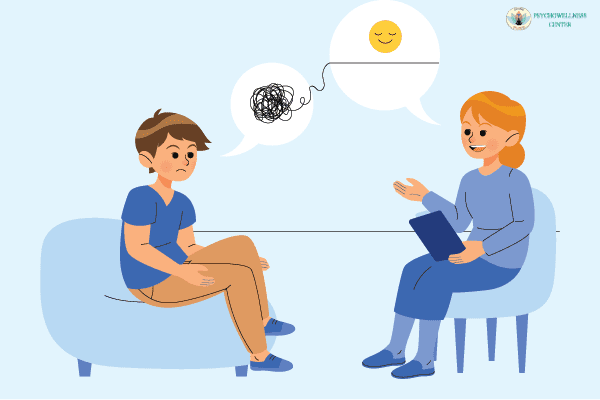School psychologists play a crucial role in fostering the mental, emotional, and academic well-being of students. They bridge the gap between home and school, providing essential support to students, educators, and families. Their work ensures that students have the necessary resources and environment to thrive academically and personally. Here, we delve into the multifaceted importance of Best psychologist and how they contribute to the overall success of the educational system.
Promoting Mental Health and Well-being
One of the primary responsibilities of a school’s Top psychologists in India is to promote mental health and well-being among students. With increasing awareness about mental health issues, their role has become more vital than ever. School psychologists conduct individual and group counseling sessions to help students navigate challenges such as Anxiety, Depression, and Stress. They also work closely with teachers and parents to create a supportive environment that fosters emotional resilience and healthy coping mechanisms.
Identifying and Addressing Learning Difficulties
School psychologists are instrumental in identifying learning difficulties and developing strategies to address them. Through comprehensive assessments, they diagnose learning disabilities, attention deficit hyperactivity disorder (ADHD), and other cognitive or developmental challenges like developmental delays. By collaborating with teachers and special education staff, they design individualized education plans (IEPs) that cater to the unique needs of each student. This ensures that students receive the appropriate support and accommodations to succeed academically.
Building a Positive School Climate
A positive school climate is essential for student success, and school psychologists play a pivotal role in fostering it. They work on initiatives that promote a safe, inclusive, and supportive environment for all students. This includes implementing anti-bullying programs, promoting social-emotional learning (SEL), and encouraging positive relationships among students and staff. By addressing issues such as peer conflict and discrimination, they help create a school culture where everyone feels valued and respected.
Assessment and Evaluation
These assessments can identify learning disabilities, cognitive impairments, emotional and behavioral disorders, and other challenges that may affect a student’s academic performance and overall well-being. Through standardized tests, observations, and interviews, school psychologists gather comprehensive data to understand a student’s needs.
Individualized Education Plans (IEPs): Based on their assessments, school psychologists help develop Individualized Education Plans (IEPs) for students with special needs. IEPs are tailored to each student’s unique requirements, outlining specific goals, accommodations, and interventions to support their learning and development.
Progress Monitoring: School psychologists regularly monitor the progress of students with IEPs and other support plans. This ongoing evaluation helps ensure that interventions are effective and allows for adjustments to be made as needed.
Consultation and Collaboration
- Teacher Support: School psychologists offer guidance to teachers on classroom management techniques, instructional strategies, and ways to accommodate diverse learners. They may also provide professional development sessions to help educators better understand and address mental health issues in the classroom.
- Parent Collaboration: Engaging with parents is a crucial aspect of a school psychologist’s role. They provide parents with insights into their child’s behavior and learning needs, suggest effective parenting strategies, and connect families with external resources and support Intervention and Prevention
- Individual Counseling: School psychologists provide one-on-one counseling to students dealing with various challenges, such as anxiety, depression, behavioural issues, or family problems. Through evidence-based therapeutic techniques like cognitive-behavioural therapy (CBT) and solution-focused therapy, they help students develop coping skills and resilience.
- Crisis Intervention: In times of crisis, such as a natural disaster, school shooting, or the sudden death of a student or staff member, the school’s best psychologists play a vital role in providing immediate support and intervention through Kids Therapy, Occupational Therapy. They help the school community process the trauma, manage grief, and restore a sense of safety and normalcy.
- Prevention Programs: School psychologists develop and implement prevention programs aimed at promoting positive behavior, mental health, and academic success. These programs may focus on bullying prevention, substance abuse education, and social-emotional learning (SEL). By addressing issues proactively, school psychologists help create a positive and inclusive school climate.
Promoting Social-Emotional Learning (SEL)
Social-emotional learning (SEL) is an integral part of a school psychologist’s work. SEL programs teach students essential skills such as self-awareness, self-regulation, social awareness, relationship-building, and responsible decision-making.
Curriculum Development: School psychologists assist in the development and implementation of SEL curricula that are integrated into the daily activities of the school. These programs help students build a strong foundation for emotional intelligence, which is crucial for their long-term success.
Teacher Training: To effectively implement SEL programs, school psychologists provide training and support to teachers. This ensures that educators are equipped with the knowledge and tools to foster social-emotional development in their students.
Monitoring and Evaluation: School psychologists continuously assess the effectiveness of SEL programs through data collection and analysis. This allows for adjustments and improvements to be made, ensuring that the programs meet the evolving needs of the student population.
Conclusion
The role of school psychologists is indispensable in today’s educational landscape. They provide essential services that support students’ mental health, academic performance, and overall well-being. Through their work, school psychologists help create safe, supportive, and inclusive school environments where all students can thrive. Their collaboration with educators, parents, and the broader school community ensures that students receive the comprehensive support they need to succeed. As we continue to recognize the importance of mental health and well-being in education, the role of school psychologists will remain critical in shaping the future of our students and schools.
Psychowellness Center offers professional mental health therapy by expert psychologists. We serve Delhi NCR, NOIDA, Faridabad, Janakpuri, Dwarka, and Vasant Vihar, ensuring everyone has access to high-quality mental health care.
Contribution:- Dr. (Prof) R K Suri, a clinical psychologist, and Ms. Sulochna, a counseling psychologist, offer vital mental health support. They are dedicated to addressing a wide range of mental health issues.

